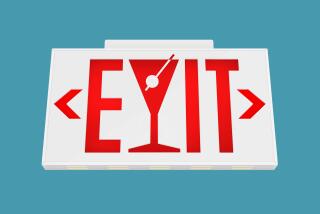‘Recovery Show’ Makes a Comeback : Talk Radio: A program for alcoholics and addicts returns to its AM time slot after a brief cancellation.
As far as Jay Cavanaugh was concerned, “The Recovery Show”--a one-hour radio program heard each weeknight on station KIEV-AM (870) since August, was the perfect solution to the lack of information provided to recovering alcoholics and addicts.
Now it appears that even the show itself is capable of recovery.
After a brief cancellation Sept. 29, because of a lack of funds, the show is back on the air, thanks to an outpouring of letters and the radio station’s willingness to temporarily donate the air time. The program will now be heard Tuesdays, Thursdays and Fridays from 9 to 10 p.m.
“Needless to say, we’re ecstatic about it,” said Annette Seaton, the show’s producer. “KIEV told us there had been a flood of calls and letters protesting the show’s cancellation, and that they’d give us the time until we could find other funding. As of right now, we’re still looking for a sponsor.”
Cavanaugh, the show’s host, said the show seemed the logical way to reach people in recovery programs.
“People know about the big programs that advertise on TV, but there is a tremendous lack of information about community programs, prevention, intervention or even the dynamics of addiction and recovery,” Cavanaugh said.
“The Recovery Show” was to have changed all that. It was designed to address all forms of addiction and offer resources relating to what Cavanaugh calls the “personal, political and social aspects of recovery.”
Cavanaugh conceived the radio program. As president and co-founder of the Inter-Agency Drug Abuse Recovery Programs, a nonprofit organization that operates chemical dependency treatment clinics in Van Nuys, Newhall and Reseda, he is continually conducting seminars on alcoholism. Seaton is his director of communications. The radio show was designed to be another form of community outreach for their drug abuse programs.
Since “The Recovery Show” first aired, topics have included alcohol, drug, sexual and gambling addictions; retreats for compulsive overeaters; the legal aspects of chemical dependency and pregnancy, and common struggles faced by recovering co-dependents. Listeners were encouraged to call in and ask questions of guest speakers, share experiences or offer suggestions.
“There are more than 1 million people in some kind of recovery program in the greater Los Angeles area, and so there’s a potentially huge audience out there,” Seaton said, based on data that the Inter-Agency Drug Abuse Recovery Programs gathered. “We felt that with so many people out there, it was amazing that there was nothing out there like this.”
Apparently, KIEV felt the same way when it was first approached with the idea of a show devoted to recovery issues.
According to KIEV program director Dick Sinclair: “We didn’t need any convincing about the show. The time of day seemed appropriate, and the man who conducts the program is very knowledgeable about his subject. We felt it was certainly called for, instead of another general talk show.”
Cavanaugh got initial funding from First Interstate Bank and LifeAlert, a Los Angeles medical paging company that Cavanaugh said had “taken an interest in recovery issues.” But an hour of KIEV air time, five nights a week, runs between $6,000 and $10,000 each month, so that $14,500 of funding soon ran out. Cavanaugh’s drug abuse programs couldn’t afford to foot the bill. He said he has approached several hospitals and has had no response as of yet.
But the show’s plug was abruptly pulled last month, when the funds ran out. The show’s cancellation was even more difficult to follow, Seaton said, considering the response it had gotten from listeners. When phones at the Glendale radio station started ringing off the hook during one of the first shows, which featured a San Diego sex therapist discussing the relationship between drugs and sex, Seaton said little doubt remained that they had struck a collective nerve.
“A lot of people called in on that one,” she said. “Very often, people get into recovery and then they start trying to fix their feelings with quick one-nighters.
“But just like with drugs or alcohol, it just makes it worse,” she said. “Here was a chance for them to talk about it.”
Another show featured singer David Crosby of the group Crosby, Stills and Nash, who discussed his own battle with drugs and alcohol and the change in his life since entering a recovery program. Several years ago, Crosby served time in a Texas prison for possession of cocaine and weapons.
There were also installments that Cavanaugh said stretched the issue of addiction to its outermost limit.
“We had some people from Prostitutes Anonymous. It was pretty wild,” Cavanaugh said, adding that there are 27 different “anonymous” programs in Los Angeles that are based on the 12 steps of Alcoholics Anonymous. “They were very frank about their feelings, and said it was a real problem because they were addicted to prostitution.
“I have to be honest with you, though,” he said. “I was a little embarrassed.”
During its two months on the air, experts in the field of treating chemical dependency also had praise for it.
“The emergence of this kind of a forum for addiction issues is a classic example of how the social and legal aspects of society have always lagged behind scientific advances,” said Dr. William Skinner, an internist and director of the chemical dependency program at St. John’s Hospital in Santa Monica.
Alcoholism was classified as a disease in 1957 by the American Medical Assn., but it wasn’t until decades later that society began to accept it as an illness and not a moral deficiency, Skinner said. The same thing, he said, holds true with shifting perceptions about other addictions.
“The fact that a radio show could address so many areas of addiction is proof that society’s level of acceptance is now catching up with the growing body of knowledge about addiction and dependency,” he said.
But Cavanaugh, 39, said he believes that there is still plenty of work to be done in the field. And if he and Seaton are unable to find a permanent “angel” to fund “The Recovery Show,” Cavanaugh will turn his attention instead to Cal State Northridge, where he is planning to complete his master’s degree in molecular biology next year.
“The question that’s been asked for some time is, ‘Do all of these addictions have something in common in the brain?’ We think the answer is yes,” he said. “All of the breakthroughs that are happening now tend to be in this area, and it’s exciting to be part of anything that will give us more effective strategies than what we have.”
Cavanaugh paused for a moment. “The truth is, anyone in the field will tell you that the recovery rate stinks, and anyone who claims anything higher than a 25% success rate is suspicious.
“So when you look at it that way,” he said, “anything we can use to increase a person’s chances of making it is worth it.”
More to Read
Sign up for Essential California
The most important California stories and recommendations in your inbox every morning.
You may occasionally receive promotional content from the Los Angeles Times.









